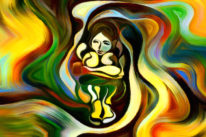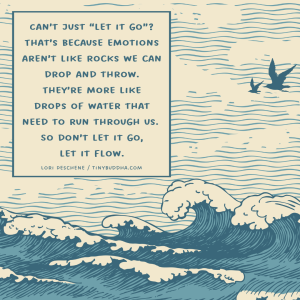
“Joy does not simply happen to us. We have to choose joy and keep choosing it every day.” ~Henri Nouwen
Once upon a time I was on a relentless hunt for happiness. I’d root around for it in romantic relationships, search for it in visits to exotic locales, and scour self-help sections of bookstores, hoping to run across a volume that, once and for all, would reveal its thorny secrets.
The books I read said happiness couldn’t be found outside of me, but I was always skeptical of that advice. I longed to believe that if I got what I wanted in life I’d be like a winner on “The Price is Right”—jumping up and hugging perfect strangers.
When I turned forty, I had the chance to test that theory: Through a series of incredible circumstances, I got almost everything I’d ever wished for. I met and married an amazing man, came into inheritance, and achieved my lifelong goal of publishing a novel.
I was surprised to discover that my happiness still depended on outside events in my life.
Great book review? Crack open the bubbly! Bad day at the stock market? Sequester myself in the bathroom with a package of Fudge-Covered Oreos. But, to be honest, my life was so fast-paced and drama-filled that I didn’t have the time or the inclination to think about the matter too deeply.
Fast forward five years and my winning streak came to an end. I found myself without a new book contract, my grown son sank into a deep depression, and my dearest and oldest friend and I grew apart.
My slew of bad luck forced me to slow down and become a seeker again. I continued to investigate the happiness conundrum and eventually came across this quote from Danielle LaPorte, “Happiness is like rising bubbles—delightful and inevitably fleeting. Joy is the oxygen—ever present.”
Bingo! All my life I’d been stalking the wrong thing. Instead of chasing after happiness, I needed to find ways to allow more joy into my life.
1. Living in the present moment.
Over the next few months I devoured at least a dozen metaphysical books, and I undertook a variety of spiritual practices: visualization, affirmations, gratitude journals, vision boards, and a few other things a little too woo-woo to mention.
While I found value in many of those activities, I didn’t experience drastic change until I practiced mindfulness. Now I meditate fifteen minutes daily and make a point to be mindful throughout the day.
Chores I used to dislike are now exercises in staying in the present moment. Instead of my usual kvetching about laundry (who goes through ten towels in three days?) I slow down and pay attention to the task and the accompanying sensory details, i.e., the lemony smell of the detergent, the comforting warmth of the clothes out of the drier, the swishing rhythm of the agitator.
When grumbles arise, I note their existence but try not to get caught up in them.
Zen masters clang gongs to remind students to be mindful; I use a timer on the computer. I set it every twenty-five minutes, and when it buzzes, I check in on myself.
This is great habit to start. When the timer goes off, ask yourself, am I present? Or am I embroiled in regrets about the past or schemes about the future? The more time we spend in the present moment, the more joyful we feel.
2. Avoiding the dramas of the ego.
It used to be that when something went haywire in my life, I’d fly to the phone or Facebook, eager to broadcast my wounds. I didn’t think there was anything wrong with venting. Wasn’t that healthier than letting my injuries fester?
Not necessarily. Through my mindfulness practice I’ve learned that it’s best not to get caught up in the ego’s drama.
When something goes wrong in my life (that guy cut me off in traffic!), my ego loves to rush to the scene, causing a commotion. Now I keep a journal of my ego’s triggers so I know when I’m most likely to be yanked into its mischief-making.
Three centering techniques have worked for me: First, pay attention to your breathing, noting inhales and exhales.
Next, get in touch with your body, connecting with the energy within and staying alert to any automatic responses. Is your throat constricted? Are your shoulders tense? Is there smoke coming out of your ears?
Finally, listen. Can you hear the refrigerator running or the traffic outside?
These three practices slow us down so we can avoid getting entangled in ego-based thoughts.
Additionally we might want also want to refrain from complaining or gossiping, even about piddling things. It may seem harmless to say to a friend “Could this grocery line get any longer? And what’s with the woman buying ten cartons of Ben and Jerry’s?”
Unfortunately, such behavior strengthens the ego. The limited rewards we get from gossiping and griping are outweighed by the joy we’ll find when we eliminate them from our lives.
3. Deep listening.
When I quit complaining and prattling on about other people, I thought, “What’s left to talk about?” Recently I found the answer: Whenever I’m in the company of others, I practice deep listening.
Deep listening requires total attention to what the other person is saying, and it’s so focused it involves the entire body. Our own thoughts will constantly arise, eager to butt in, but try using one of the previously mentioned centering techniques to shush them.
If we practice deep listening our interactions with other people will become much more authentic and yes, far more joyful.
The Rewards of a Joyful Life
I’ve been inviting joy in my life now for almost two years. Does that mean I shun happiness? Of course not. Happiness is always welcome.
It’s penny candy raining from a piñata. It’s the burst of light from a sparkler. It’s the magician’s bouquet of flowers, blossoming into a dove. But I now understand happiness’s limitations and am no longer expecting more from it than it can give.
I’ve also come to discover that joy, unlike happiness, is not elusive or subject to the whims of fate. Joy is what kindles within us once we give up our resistance to the present moment and our demands that life do our bidding.
Ironically, when we quit expecting life to be a certain way, life seemed to naturally align itself with our preferences.
In fact, in recent months, my son’s psychological problems receded, two books contracts materialized, and my relationship with my best friend healed. However, even if nothing had changed or if my fortunes had soured, it wouldn’t be a disaster.
If we allow joy into your lives, we’ll no longer be buffeted about by life’s circumstances. As Eckhart Tolle says, “You can only lose something that you have, but you cannot lose something that you are.”
Joy is our natural state; we all have access to it, no matter what craziness happens in our lives.
Man and pink sky image via Shutterstock
About Karin Gillespie
Karin Gillespie is the nationally bestselling authors of five novels, and has written nonfiction pieces for the NY Times, Washington Post and Writer Magazine. She regularly blogs, facebooks, and tweets.













 Though I run this site, it is not mine. It's ours. It's not about me. It's about us. Your stories and your wisdom are just as meaningful as mine.
Though I run this site, it is not mine. It's ours. It's not about me. It's about us. Your stories and your wisdom are just as meaningful as mine. 